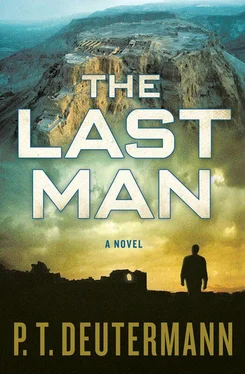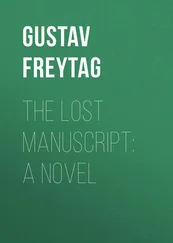“To give a man hope when there is none is a dangerous game, Yossi,” Gulder said. “You’d best be very careful with your lies.”
“That’s a yes, then?”
Gulder gave him a long look and then nodded. He gave Ellerstein a phone number to call.
Two weeks later the abbot joined David in the garden right after lunch and sat down next to him. David smiled and closed his book. The abbot was known as Father Kamil, and he was somewhere between seventy and a hundred years old, with the face of an Old Testament prophet and a long white beard to match. David had told the abbot all about the Second Temple finds at Masada and explained his own presence at the monastery as a way of keeping the discoveries an Israeli triumph.
“How goes the Latin lesson?” the abbot inquired, apparently uninterested in David’s backstory.
“In res omnia, patiencia,” David said.
“Not even close,” the abbot said with a laugh. “I have news for you. A visitor.”
“Should I be afraid?” David asked.
“Your visitor is a woman, so I would say definitely yes.”
“How would you know that, Father Abbot?”
“I was not always a priest, Mr. Hall. Many of us here lived among the Gentiles, as we like to call the rest of the world, and now we’re here, of our own free will.”
“Recognize danger when you see it, do you?” David asked.
“Perhaps you are here because you did not recognize danger when you saw it, Mr. Hall?”
“Touché,” David said with a grin. “Is my visitor Judith Ressner, by any chance?”
It was evening when the helicopter announced its approach with the usual clattering roar. A few minutes later one of the monks escorted Judith into the cloistered garden, bowed, and left them alone. David stood up to greet her, not quite sure of how to do it. She solved his problem by dropping her tote bag and coming into his arms. They held each other for a long time before she finally lifted her head.
“I have missed you, Mr. Hall.”
“Never thought I’d see you again,” David said. “How did you manage this?”
“Yossi Ellerstein managed it, not me,” she said, sitting down on the stone bench and pulling her bag over. “Have you become a monk, then?”
David looked down at his monastery garb and then tugged on his beard. “How do I look?” he said.
“Suitably holy,” she said with a smile. “I must be quick. The helicopter must leave before full dark. I brought you something.”
“A ladder, I hope,” he said. “Or a one-way ticket out of this place? A sign that I’m not stuck here forever?”
“No ladders,” she said. “Yossi tells me that he and other people are working to get you released. First the government must bury the Skuratov incident. That takes time.”
“I told Ellerstein that I could damned well keep that secret,” he said. “I have nothing to gain and everything to lose by opening my yap.”
“Still, they must be very sure. Your uncle — Jack Hall, is it? — He has contacted the government. The fact that he is a nuclear agency official complicated matters.”
David sat back with a sigh. Of course it would, he thought. Heavy water diversion. Shit.
She took his hand. “Yossi says the government knows it can’t keep you here forever. He says that he and I must come up with a plan that solves the government’s problem for them. Hopefully before the prime minister’s political problems bring on an election, or the Arabs bring on another war.”
“My being locked up here in the Golan Heights does solve their problem, Judith. Ellerstein may be more concerned about what you might say one day, not me. All I can say these days is amen.”
The monk reappeared at the garden gate and beckoned Judith.
“I must go, David. Here: I have a package for you. This might well be your way out.”
“What is it?” he asked. He heard the helicopter’s engines starting down below the walls.
“Something very special, David. Get the monks to put it in a closed room, and then you’ll understand.” She leaned over and gave him a quick kiss on the cheek. Then she was gone.
As the helicopter lifted off into the darkening sky he opened the tote bag. Inside was a cardboard box, tied up with common white twine. Inside he found a green felt cloth. The cloth contained the wine bowl from the cavern.
David felt a chill go up his back. He reached in to extract the bowl but then paused. The writing on the wall had alluded to a connection between Judah’s tragic brother and this wine bowl. They had both jumped to the same conclusion, but of course there was not one shred of proof. Still, he found himself very reluctant to touch it. He rewrapped the bowl in the felt cloth. Then he remembered her suggestion: Put it in a dark room. Like the chapel, perhaps?
* * *
“So, how did it go?” Ellerstein asked Judith. “Did he look healthy?”
“A little gaunt,” she said, shifting her phone to the other hand so she could mute the television. “I think he’s used to more food than they are giving him in that place.”
“All Americans are used to more food,” Ellerstein said. “What about his state of mind?”
“He wants out, of course. He knows why he’s being held there, but wonders why they won’t trust him to keep his mouth shut. As he says, there is no benefit to him for revealing what happened.”
“Americans are funny about things like that,” he said. “He gets out, goes home to the States, then thinks about his fifteen minutes of fame and maybe wants to try that again. Americans seem obsessed with fame.”
Remembering what David had said, she asked him if he was worried about what she might say one day. Ellerstein stared at her for a moment. “Oh, my,” he said. He began to fiddle with his pipe.
“What, oh, my?”
“He saw right through it, didn’t he? Your coming to him, promising him a chance at release. He knows.”
“Knows what, Yossi?”
“He knows he’s never coming out of there, that is what.”
Judith surprised him. “I don’t believe that, Yossi,” she said. “Governments come and go. The past becomes the past, nobody cares. Paperwork gets lost, stories become diluted. Once all that happens, then there will be no point to keeping him.”
“Well,” he said, “I hope you’re right. It does seem unfair, especially after he led you to such prominence. You are right about governments coming and going, especially with these uprisings in the Arab world.”
“Intifada, yet again?”
“No. These Arab uprisings are generational, Yehudit. The young men throwing over the old men. The problem is that nothing in their lives will change except that there will be no wise old hands to restrain them.”
“I’m glad I did what I did, then,” she said. “Up there on the mountain.”
“What was that, Yehudit?”
“If I am right, you will soon see.”
He chuckled. “Stay in touch, Yehudit. I will do the same.”
She switched off the phone and put it down on her dining room table.
Stay in touch, she thought. Just you wait, Yossi.
* * *
Late that night one of the monks knocked on David’s door. He had no idea of what time it was, having taken off his watch weeks ago. He kept monastery hours, for the most part, going to bed when they did and getting up for the early morning services in the chapel.
“What is it?” he asked.
The door opened, and one of the younger monks, who spoke no English, motioned for him to get up and come with him. He held the candlestick high so David could put on his robe and sandals. Then they went to the chapel, where it looked like all the monks were gathered by the front door, including Father Kamil. The doors to the chapel were partially open, and the monks were murmuring to each other excitedly. Father Kamil gestured for David to join him on the top step.
Читать дальше












